It’s 2021 – When Will Motorhome Travel Be Possible Again?
As the UK’s third COVID-19 pandemic lockdowns start to show signs of easing, this blog post takes a look at when domestic and international motorhome and campervan travel, tourism and holidays might restart. The situation is highly fluid, complicated and varies by UK country, and I’m just an amateur travel blogger, so please treat this post only as a pointer for things to think about and research as you plan ahead. I have mainly focused on the rules for English citizens as they are the ones that affect us directly. If you are reading this in Scotland, Wales or Northern Ireland please take into consideration the rules put in place by your own devolved administration.
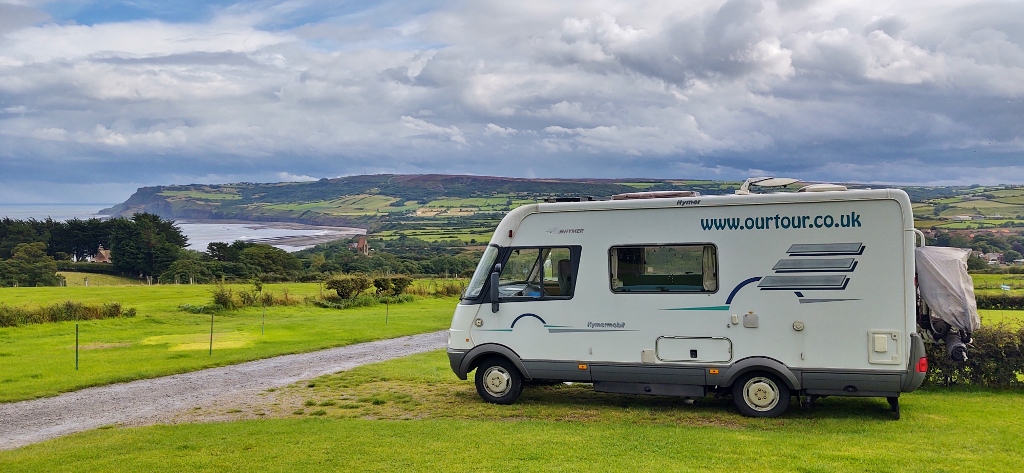
Although leisure travel is currently illegal in the UK, mass vaccination is continuing at an astounding pace with more than one third of the UK population having now had its first jab. Each UK nation is starting to announce how they plan to return to normal during 2021 as rates of hospital admissions and subsequent deaths are falling more quickly than most of us might have hoped for. Fingers crossed this continues as restrictions ease. For the moment UK-based motorhomes will have to stay mothballed, but the time is coming when travel and holidays will again be possible.
Taking Motorhome Holidays in the UK in 2021
After a hard, cold winter combined with yet another tough national lockdown, I imagine most motorhome and campervan owners will be desperate for a few days or weeks away. As I write, it’s looking like this will soon be possible, with English campsites hoping to re-open from 12 April, depending on what happens over the next few weeks, although they may have to keep their shared facilities like shower blocks closed until at least 17 May.
Closed shower blocks might put some people off, but our motorhome and many like it have all the on-board facilities to mean we don’t need one: a shower, wash basins, toilet plus hot and cold running water from an on-board tank and gas-powered water heater. We also have a solar panel and leisure batteries, plus a small inverter for 230V devices, so we’re not dependent on getting a pitch with electrical hook-up (assuming our fridge decides it’ll work again on gas!).
Take a look around our Hymer B544 motorhome:
According to the Caravan and Motorhome Club’s latest news, sites in Scotland will have to stay closed until at least 5th April when the ‘stay at home’ restriction is expected to end (some islands don’t have this restriction, but most of the country does). They’re taking no new bookings for the dates between 5th and 25th April, suggesting an opening date of 26th April might be more realistic. More details are expected to be announced mid-March (in a week or so from now).
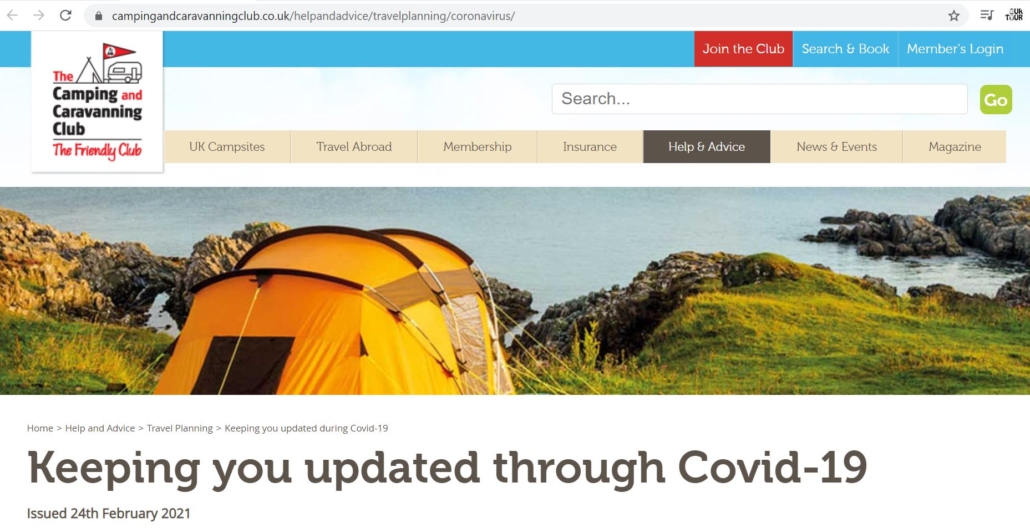
The Caravan and Motorhome club hope to re-open their Welsh campsites from 29th March 2021. They’re not sure whether they can re-open shared facilities like shower blocks yet. In Northern Ireland, no date appears to have been set for re-opening and the Camping and Caravanning club website states: “Restrictions have been extended until 1st of April and we are awaiting further details, which are due to be announced on the 18th of March.”
So by the end of April many UK motorhome owners will *hopefully* be able to travel to campsites at least in their home nation. It would make sense to check with your preferred site if they’re actually opening up, whether the shower block and other facilities are open, what the check-in procedure is and if they have space of course. One thing I’m not sure about is when leisure travel across UK national borders, from England to Scotland for example, might be come legal again.
Also, the difficulty of travelling abroad (more info below) will almost certainly lead to larger numbers of us staying on UK campsites this spring and summer. It seems likely the more popular sites, especially those in the big two clubs, will fill up at times. However, the UK has a huge network of sites and there is bound to be space at more out-of-the-way locations (ukcampsite.co.uk, searchforsites.co.uk and pitchup.com are all great websites for tracking down a suitable pitch).
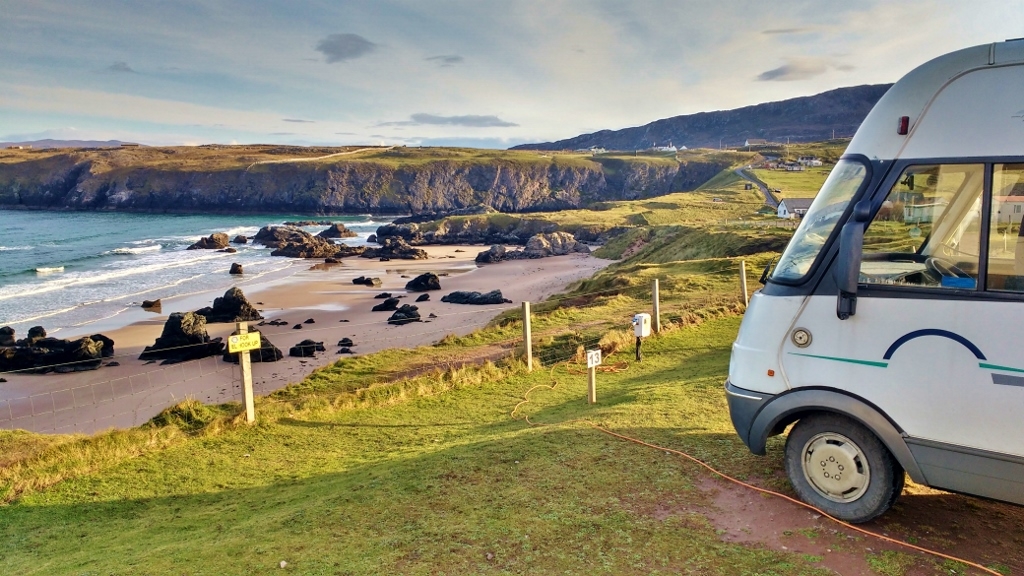
There’s also the Britstop scheme to consider, a book which lists out over 1,000 host businesses which allow motorhomes to stay overnight for free. Many of these locations are pubs, which are due to re-open in England for outdoor service from 12 April. Some pubs will likely put tables on their car park areas though so they can cater for more people until they can serve folks inside, so it would make sense to call ahead and make sure you can actually park there before setting off.
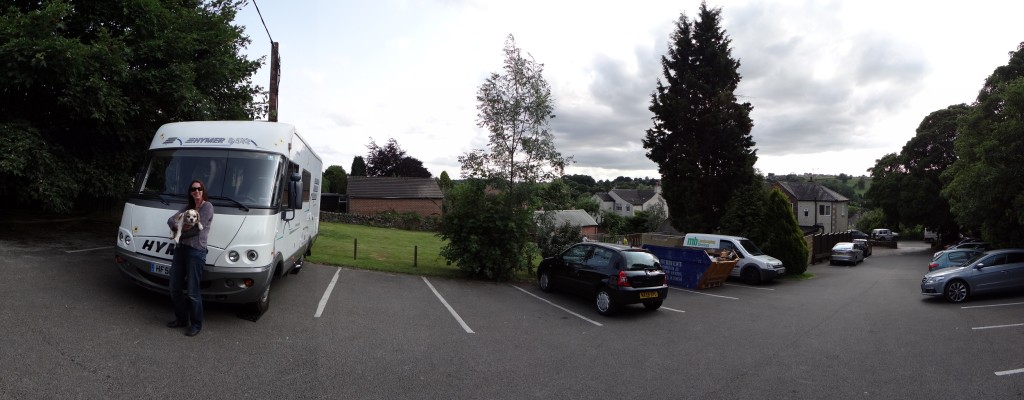
Taking a Motorhome Abroad in 2021
At the moment leisure travel from the UK to the continent is illegal. UK law prevents tourists leaving the country, and laws in many countries prevent us from arriving (Ju has just told me the Netherlands have lifted this restriction from 10 March 2021, and France followed suit from 12 March 2021). England is looking at allowing international leisure travel to restart and has suggested the 17th May might be the first point this is allowed. A report is being drawn up which is due on 12 April, which should indicate plans to restart international travel.
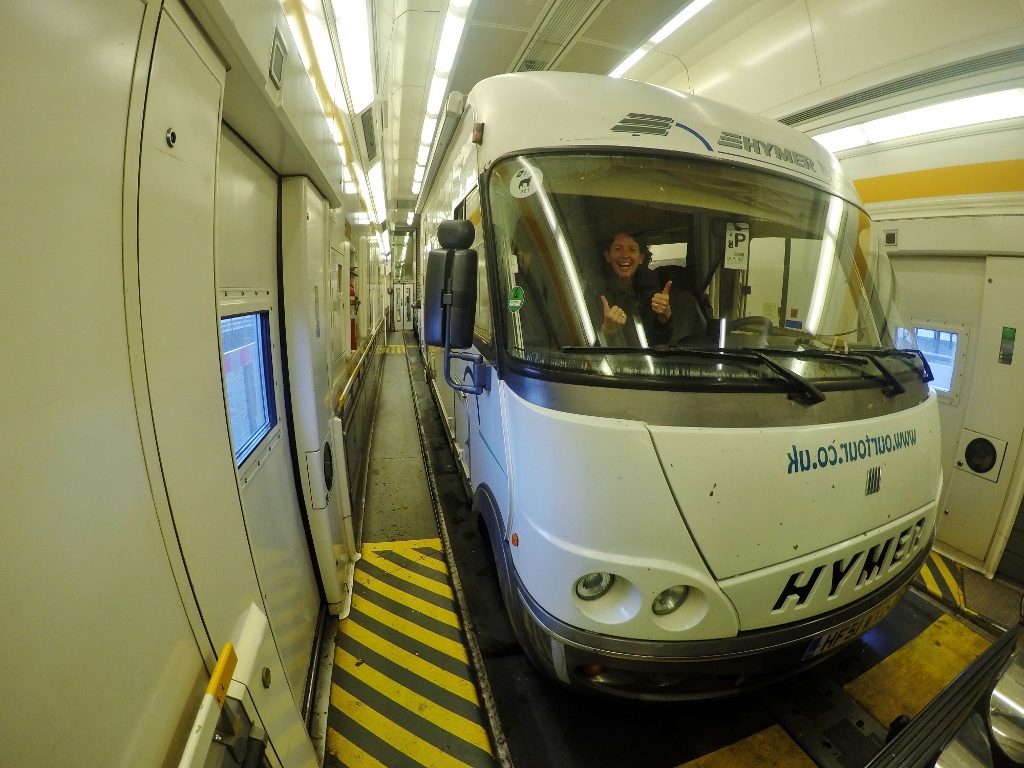
As things stand though, even if the law in the England and France (I’ll use these two countries in the examples below), were to change tonight to allow tourists to travel tomorrow (France allowed UK tourists from 12 March 2021), that wouldn’t help most of us much. Aside from whatever insecurities we each might have about travelling, there are a several more blockers (there’s a good government summary of these rules here):
- Testing Requirements. To enter France, you currently need a PCR test taken within 72 hours of entry. To return to England you need an antigen/PCR test with 72 hours of departure, and then have to take two more tests while in quarantine back in the UK. The tests aren’t cheap: an antigen costs at least £40, and PCRs £100 or more. For those of us travelling as a couple, that’ll add at least £700 to the cost of the trip, not to mention the stress and hassle of arranging and taking tests at home and abroad. If you wanted to reduce your 10 day quarantine down to 5 days, that’s possible but you’ll need an additional PCR test, which would bring the testing cost for this couple to over £900 and for a family of four over £1,800.
- Quarantine. Tourists returning to the England have to quarantine for at least ten days (unless they pay for the Test to Release scheme, which might shorten this to 5 or 6 days). Anyone who’s been in a ‘red list’ country in the past ten days will have to use hotel quarantine, at a cost of £1,750 for the first person, plus £650 for each additional adult. Portugal is currently on this red list, and we got a message from Brittany Ferries yesterday (we’re booked to travel on their ferry from Spain later this month) advising us that if we’d been to Portugal in the ten days before we travel home we would have to fly back to one of five designated airports in England as arrivals from red list countries aren’t allowed to arrive by sea. We’re currently in Spain (we’ve not been to Portugal on this trip), and if Spain were added to the red list meaning we’d need to hotel quarantine and could only arrive by air, we’d need to travel back through France for ten days before we could take a ferry or the tunnel home (requiring a PCR test to enter France, in addition to the one to enter the UK).
- Travel Insurance. With the old EHICs and the new GHICs, UK citizens can still generally access necessary state-provided healthcare in most European countries for free or reduced cost. Travel insurance is still advisable though, and while the UK Foreign and Commonwealth Development Office recommends against travel to any particular country (all of them at the moment), the insurance available is limited. We bought insurance from True Traveller which covers us here in Spain for everything other than COVID-19 itself, even with the FCDO advising against travel here, but it wasn’t cheap. Interestingly Andalucia is providing free Covid-19 cover during 2021 for all international travelers staying in registered accommodation (which includes some campsites).
- Passenger Locator Forms. When arriving in Spain we had to complete a form stating we had no COVID-19 symptoms and hadn’t been near anyone who had, give our contact details and where we planned to stay in Spain. We’ve stayed put on a campsite, so gave the address of it, otherwise we’d have given the first location we planned to stay. The UK has a similar form for re-entry. The forms aren’t too hard to complete, and you can save them to your phone so you don’t have to print them off. These forms, along with proof of a negative covid test in the last 72 hours and proof that you have bought your ‘day 2 and 8 quarantine tests’ need to be shown when you check in for your transport home.
- Local Laws. Here in Spain we have to wear a facemask in public, as soon as we’re off our campsite pitch. There is a nighttime curfew, so we can’t be off the site between 10pm to 6am. We can’t legally drive to the adjacent province of Granada, unless we plan to travel home or have another reason from a predefined list. At times we’ve been unable to legally travel to the adjacent town of Torrox, as the COVID-19 positive tests there were too high and the town’s borders were closed. It’s been illegal for more than 4 people from different households to meet. There’s a huge list of these laws, they vary between parts of Spain and they seem change frequently. Keeping a track of them to stay on the right side of the police is quite a job, even without moving from place to place.
- UK-Provided COVID-19 Vaccinations. One last point: if like us you’re still awaiting your vaccination, or have a slot for your second jab, then being in the UK makes sense to allow you to get it. The jab isn’t available abroad to us, as far as we know, and we’re keen to get that shot in the arm folks, so we’re unlikely to travel abroad before we get vaccinated.
There is a specific group of travellers for whom the above challenges might be far more palatable: the long-termers. Those of you planning a multi-month tour or wanting to restart full-timing outside the UK will be less put-off by these requirements, especially once you’ve had both jabs (I imagine). These bloggers continued to write and tour during the pandemic, if you’re after some insight.
Campsites and aires are largely open across Europe (check the date on comments on websites like park4night to get an idea of the status in each location). The need for tests and quarantine upon re-entering the UK, may be either reduced or even removed by the time you return home, or at least you can budget for them. If you do plan a long-term trip (over 3 months) remember the need to leave the Schengen Area though (you might need to head for Croatia, Morocco or another non-Schengen country), and plan for the other impacts of Brexit. Also be aware some countries require PCR tests at land borders, and potentially quarantine too, pull up re-open EU do your research before heading out.
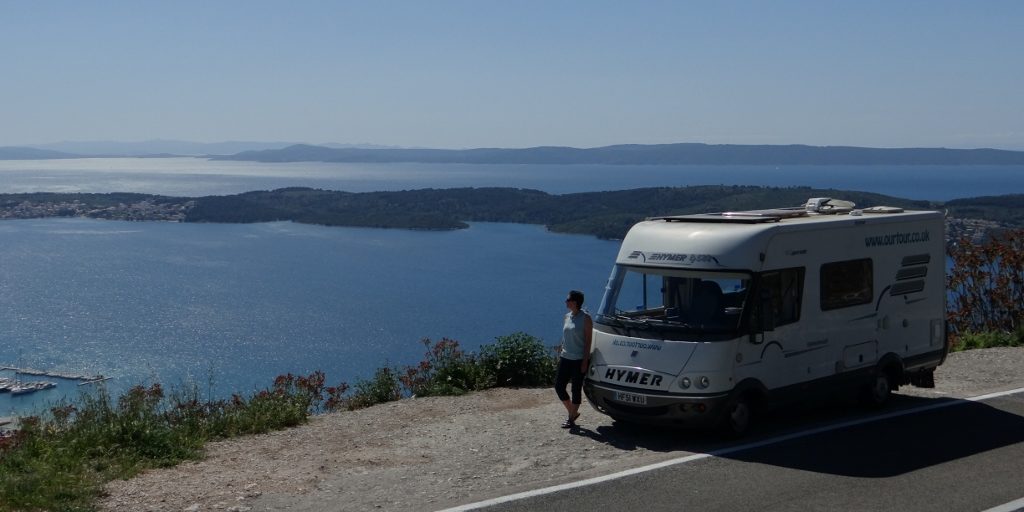
How Might All of this Become Easier?
The UK government report on 12 April should shed some light on the approach to be taken, which could include using ‘vaccination passports’. These would provide proof of which COVID-19 vaccination we’d had and when, giving some level of confidence that we were immune. There are a ton of ethical, technical and logistical questions around these passports though. My guess is any widely internationally-agreed scheme will take a long time to put in place. In normal times I would guess at least a year, probably much longer. In COVID-19 times, with populations desperate to regain their travel freedoms and entire industries crumbing to dust, I guess these things could be done rather more quickly, we’ll see.
If there’s no internationally agreed format for vaccination passports, there are already rumblings that some countries will accept tourists anyway with proof of vaccination or even proof they had the virus already. Looking around us here in Spain, the hotels are closed, the beaches empty, there are no taxis on the roads, the restaurants which remain open are pretty much deserted. Yes, it’s still winter, but the places is usually an all-year destination. Come the summer many livelihoods will be on the line if there are no foreign tourists. Across Europe the pressure to get tourist income flowing is already building with Spain proposing to run a vaccine passport trial and the EU presenting more information on its ‘digital green passport’ on March 17th.
Even without vaccination certificates, international leisure travel could restart anyway as the prevalence of the disease falls, as it did in the summer of 2020. The question over how variants of the virus can be managed seems to be the big one, and I imagine there’s a ton of work going on to see how well these variants are handled by the existing vaccines. I also guess travel will probably be restarted to just a few countries to start off with, where these variants are rare, or there’ll be an acceptance that stopping their transmission is impossible in the long-term. Finally, assuming testing remains necessary for the foreseeable future, the cost of private tests will hopefully be reduced and made more convenient, as more places off the service to an increased customer base.
In Summary
Hang on in there folks. As the weather improves in the UK so will your options to start getting out in the fresh air in your van. We stayed on a few English sites last summer and felt safe and comfortable in our motorhome, able to keep our distance from people while also enjoying walks and runs in the countryside. This summer we’ll hopefully get to do the same.
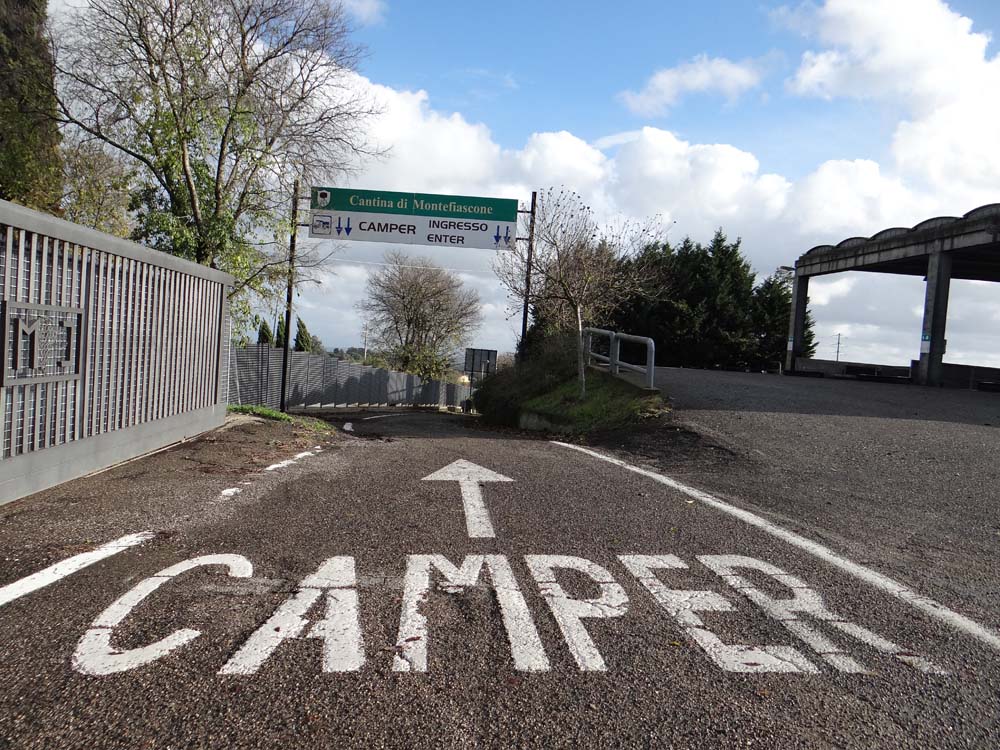
We have a privileged life us two, and have spent most of the winter in our van on a campsite in southern Spain. Once we’re home in Nottinghamshire and out of quarantine, we’ll be more than happy to potter around the UK and maybe Ireland this summer. For those of you desperate to kick off a much-delayed dream holiday or tour of Europe though, we wish you the very best of luck and hope the COVID-19 situation allows for it quickly and safely. We’ll keep the blog updated as more information arises.
Cheers, Jay



Hi Guys. Much appreciated info from you guys. Glad you had a good winter. I am itching to get on the road all being well in the uk this year. Safe journey home at the end of the month. Regards. John ps. Really enjoyed your bloggs throughout the winter. Stay Safe.
Thanks very much John – the best of luck for your travels in 2021 and beyond – Jay 👍